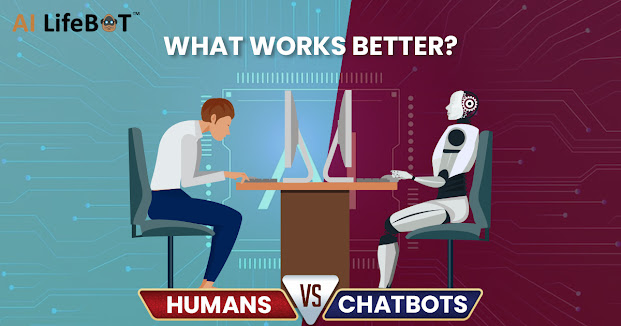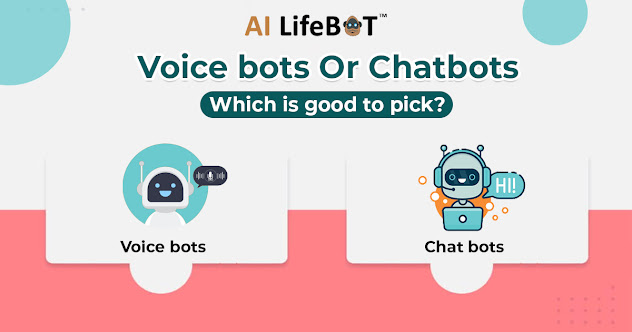CHATBOTS VS HUMANS: WHAT WORKS BETTER?
Human
conscience cannot be replaced. For the time being, it is, at least. It is not
surprising that clients want to be treated with compassion. To provide them
with the right value on time, they want businesses to understand where they are
coming from. Although live agents have been excellent at providing customers
with appropriate service, the debate over AI and humans continues. Has the bar
been set so high by human customer service agents or is AI superior to them?
When can human interaction and digitization be combined to enhance customer
experiences?
People
are extremely happy that their problems are dealt with immediately and without
a hold time, but many also lament the loss of the personal touch. Because chatbots can't understand human
input, 47% of businesses are still hesitant to use them. The topic of chatbots vs. humans brings up an important query: Are
chatbots outperforming humans in customer service? Let's take a quick look at
the customer service features offered by both parties and the advantages they
are anticipated to provide to provide an answer.
Comparing Human & Chatbot
Abilities:
What
are the comparative skill sets of humans and chatbots, then? Humans are capable of reading between the
lines, having emotional intelligence, and sensing the tone of a
conversation. In terms of quick
responses and complicated calculations, chatbots excel. They are capable of effectively managing
hundreds or even thousands of conversations at once. A person can then intervene to handle any
complications that arise.
In
essence, chatbots are experts at answering routine, frequently asked questions
quickly. Humans are excellent at
comprehending the complexity of human emotions and adjusting their responses
accordingly. Additionally, we're much
better at comprehending odd word choices.
AI
or humans: who is better at providing customer service?
The
human race has its advantages. And for decades, customer support has largely
benefited from these strengths. However, chatbots are quickly becoming one of
the best options for support teams. The conflict between AI chatbots and people
needs to be solved.
Another
query is whether AI chatbots vs. humans is truly a conflict of opposites or if
they can work in tandem. Verloop.io provides an in-depth comparison of the two
based on the fundamental strengths of each, even though different businesses
believe that either one should be adopted:
1.
Personalization with understanding
When
a customer enquires about their issue, humans have developed the ability to
comprehend by asking pointed questions. Since it's simple for them to adjust
their responses to fit the situation, they are more aware of the current issue.
Chatbot responses, however, sometimes sound scripted, which might annoy
customers rather than be helpful. Therefore, humans versus AI are the key
players in understanding personalization.
2.
The capacity for multitasking
A
human being cannot effectively handle hundreds of queries at once, no matter
how diligent they are. Agents are
already overworked in this day and age. In actuality, 74% of contact center
employees are in danger of burning out. A chatbot, on the other hand, can
handle numerous, repetitive requests and provide users with answers
simultaneously, improving the user experience. A chatbot, on the other hand,
can handle numerous, repetitive requests and provide users with answers
simultaneously, improving the user experience. So when it comes to multitasking
between chatbots and humans, a chatbot is the winner.
3.
Accessibility and speed of response
Customer
satisfaction increases as problem resolution times decrease. A chatbot offers
better real-time solutions and quick response times. Chatbots can quickly
provide the necessary solutions even when there are a lot of customer
inquiries. A distinct advantage that chatbots have over humans is their
constant availability. A chatbot is therefore clearly superior to humans in the
AI chatbot vs. human debate.
4.
Ease of communication and use
Although
chatbots appear simple and uncomplicated, many of them operate solely using a
set of keywords, which can occasionally be a little challenging. According to a
study, 46% of consumers thought chatbots were purposefully preventing them from
speaking with an agent. Humans triumph over AI chatbots due to their ease of
use, communication, and overall ease.
5.
The price
Unlike
humans, chatbots don't require the same kind of substantial upfront investment.
Additionally, chatbots can reduce costs for businesses by up to 30%. A business
seeks to maximize profits as it operates to make money. By using a
conversational chatbot, businesses hope to cut their customer service expenses
by about 30%. Humans, on the other hand, need money for things like training,
recruiting, and various other things.
So,
when comparing the cost of humans versus AI, chatbots are superior.
Are AI Chatbots More Effective Than
Humans?
It's
a close call if we compare the aforementioned differences between artificial
intelligence and human intelligence. When contrasting AI chatbots with humans,
comparisons, strengths, and weaknesses all help to highlight which option is
preferable. While live chat for customer service is excellent, a chatbot's
capacity to handle numerous inquiries is fantastic.
The
future of business is undoubtedly AI, but human customer service agents will
always provide the distinctive personalization that today's consumers
ostensibly value so highly. Although chatbots won't completely replace people
in the customer service sector, a complementary team of the two will
undoubtedly produce better customer service outcomes.
To
provide a seamless customer service experience, AI LIFEBOT offers highly
integrated, multilingual, and engaging customer support involving B2H (bot to
human) and H2H (human to human) interactions.
.jpg)



Comments
Post a Comment